The village is calm, the village is happy? Certainly not in the Second Polish Republic. Before the war, we had peasants, and the state rarely extended its apparatus to settlements scattered in forests and swamps. The peasants could therefore feel unpunished, and considered the best justice to be handed out.
What were disputes about? Most often, of course, about copper. In February 1936, Dziennik Poranny informed about disfellowships of two farmers from Budziszewsko near Oborniki. A certain Urbanek lived in constant conflict with his neighbor Pawełek. Apparently, quarrels were their daily bread. Eventually one of them ended tragically.
Pawełek - as witnessed by the witnesses - he whispered to Urbanek, insulting his family at the same time. The agitated Urbanek grabbed a stone and from a distance of 3 meters threw it at Pawełek riding his bike. The effects of this were disastrous. A few hours after the accident, Pawełek died of a fractured skull base.
For revenge with a dragoon in hand
The perpetrator was arrested (although only after three days!), And then before a court, which sentenced him to a year in prison for manslaughter. On the other hand, Bronisław Sielczan from the village of Podmarzyn, who became very upset with his neighbor, for the fact that he brazenly struggled into his field, acted completely deliberately. So he took the orc in his hand and killed his neighbor with a blow to the head.
"Nowiny Codzienne" from May 1932 reported: After the crime he had committed, Sielczak tried to plow the corpse to cover up the traces of the crime. The murder was [however] discovered by the family of the deceased, who notified the police. In turn, in the village of Golaszewice in the Brzeziny district, in 1931, as reported in the press headlines, an Cain crime took place.
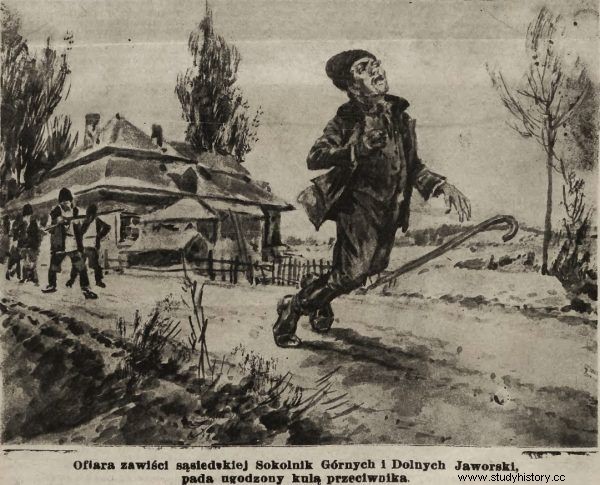
Neighborly settlements in the Małopolska countryside. Figure from "Illustrated News".
The two brothers quarreled over who was to own the hay from the meadow that separated their fields. When one of the brothers left the village for the day, the other took the opportunity to take away the mowed hay. "Dziennik Łódzki" reported:
In the afternoon Antoni Ruta returned and informed about the hay, armed himself with a revolver and a bayonet and ran to the meadow to his brother. Antoni demanded that his brother stop clearing the hay, and when he refused, he shot him, wounding him fatally in the head, and then he killed him lying on the ground with a bayonet.
No one was surprised by such neighborhood "quarrels". In general, peasants were able to approach the topic of neighborhood extremely irritatingly. They squabbled not only with the farmers from behind the fence, but also with the inhabitants of the surrounding villages. In December 1921, the Krakow-based Nowiny Illustrowane reported:
In many parts of our country there is a strange antagonism between the nearest municipalities, and often even between the inhabitants of the same, giving reasons (...) for quarrels and fights , ending often bloody.
This is what happened near Lviv, where two halves of one large village had been waging guerrilla warfare for a long time:Sokolniki Górne and Sokolniki Dolne. Each occasion was considered a good excuse for a fight, especially an occasion accompanied by alcohol. Some residents of Falconry beat others at weddings, in an inn, at a fair. And the others were responsible for the fair ones.
Peasants with guns
On December 3, 1921, a great party took place at one of the hosts, and after that, in the courtyard, an argument suddenly arose, which soon turned into a fierce fight. The Sokolniczans from Dolny were led by a certain Jan Jaworski. There were more of them, so they broke the falconers into sour apples. The losers retreated, throwing insults behind them. However, they returned home only to plan a bloody revenge on Jaworski.
With revenge, the panting minds did not lose their tension after a long night's sleep. On Sunday, they waited for Jaworski and finally caught up with him in the tavern [the inn - editor's note]. KJ]. There was an opportunity for a bloody revenge.
The workers ran to the ham and one of them, approaching Jaworski, put the revolver to his temple in the blink of an eye and pulled the trigger. The cartridge was wet, the revolver failed. Jaworski, seeing what was happening, started to run away and then the second farmhand fired a French rifle at him from a distance of only 15 steps.
How many different weapons did these ordinary Polish peasants carry with them! Of course, Jaworski had little chance, especially since he had apparently left his own gun at home. A rifle bullet hit him in the spine and punctured his lungs, ripping away a large part of them.
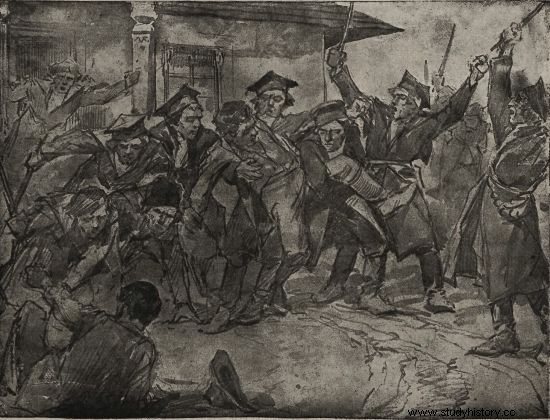
Country style justice.
He fell to the ground and spat in pain for the next several minutes. Nobody helped him, and the attackers went home as if nothing had happened. Ultimately, the police arrested only two shooters, and the fights between the Sokolnicans were still in full swing.
A similar story took place in 1936 in Gierwaty in the Vilnius Region, where the inhabitants of two villages, Zawielców and Sokołojców, joined the fight. Almost everyone was completely drunk. When the police tried to calm down the crowd, they rushed - now in solidarity - directly at the officers. Dziennik Poranny reported:
Total order was restored thanks to the arrival of a larger police force and a fire engine which very effectively dispersed the adventurers with jets of water.
Apparently, there was no similar pump near Krotoszyn in Greater Poland, because young men from two villages - not disturbed by anyone - fought a bloody battle there. One of them was fatally wounded. Several others were arrested.
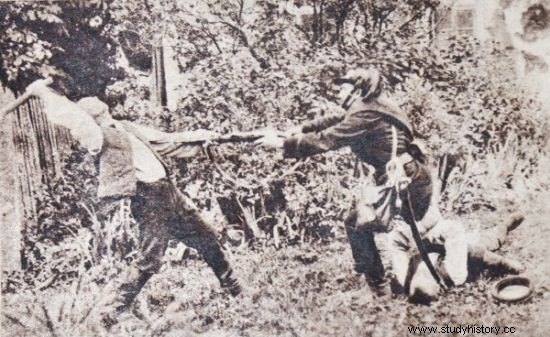
A gendarme in the fight against a criminal highlander. Photograph of the 'Secret Detective'.
If the peasants were able to deal so decisively with their own people, then much less with the strangers who had taken them under their skin. The Krakow press reported in the early 1920s about lynching as a common reaction of the village to banditry that spread in the country after the war. Journalists almost warned the criminals against forays into the countryside: The population defends themselves too, and woe to the bandits who fall into their hands.
Rural lex, sed lex
An uninteresting fate befell, for example, a group of dark star types who ventured to Korzkiew near Ojców in February 1921. They immediately caught attention:they were talking loudly in front of the church during the mass, and even openly criticized the sermon of the local parish priest ... aimed at the thieves marauding in the area! One of the hosts quickly added two and two and followed the uninvited guests as those from outside the church headed towards the rectory. The bandits tried to catch him and neutralize him, but they only made noise. And the fact that the whole village pounced on them:
People quickly ran towards the parish building. One of them, Józef Błachowski (...) , was caught jumping on the fence, and the other one between the door , two others, shooting and threatening with a bayonet, ran towards Giebułtów.
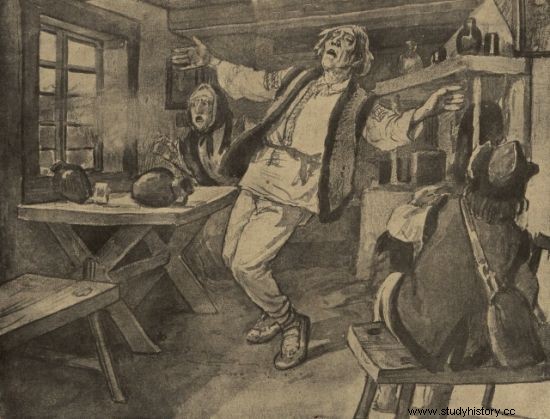
Rural terror in Małopolska
The parish priest immediately sent some henchmen to Ojców, 8 kilometers away, to inform the police about the incident. The crowd, however, did not want to wait for the officers and burned with revenge. He began to beat the intruders with sticks and would probably have bludgeoned them to death had it not been for the intervention of the local school principal. Also:
He told them to tie them up and close them (...). Beaten to impossibility, bloodied, blue-eyed, lay down against the wall of the stables, groaning and crying "God" for help .
They could not count on God's help, but their fugitive partners were not going to leave their colleagues out in the cold:
In the afternoon, four policemen from Ojców came, and on the other hand, one of the escaped, Wojciech Nowak, brings his gendarmes from Giebułtów to defend and collect his comrades with a demand to punish the beating hosts.
The measure changed, and the peasants turned out to be not stupid. They immediately clearly showed which side was the fault and who should have been put behind bars. Nowak fell into a trap he set because the militia from Ojców took him as well. In this way, three dangerous bandits were caught. And, by some strange coincidence, the number of robberies in the area has dropped significantly ...
Bandziory upstairs
However, in other villages the thugs prevailed. Armed gangs attacked mainly farms located close to the forest, located away from other buildings. So that no one can come to the aid of the victims, and the loot can be easily fled.
In February 1936, in the village of Pruszkowo near Bydgoszcz, three masked men armed with revolvers burst into the house of the Wesołowski family through the kitchen window. It wasn't even the middle of the night, but only 10:30 pm.
The bandits terrorized the householders, made them lie down on the ground and demanded that all their money be returned . The host, Bronisław Wesołowski, did not intend to wait for death idly.
At the first opportunity, he sprang to his feet. He ran towards the yard, and his wife Marta and daughter Bronisław immediately followed him. It was not the right decision:
One of the bandits attacked Wesołowski, knocked him to the ground and crushed his skull by hitting him on the head. Death (...) happened immediately. The other bandits, on the other hand, attacked the defenseless women, showering them with a barrage of revolver bullets . The women soaked in blood and badly wounded fell unconscious to the ground.
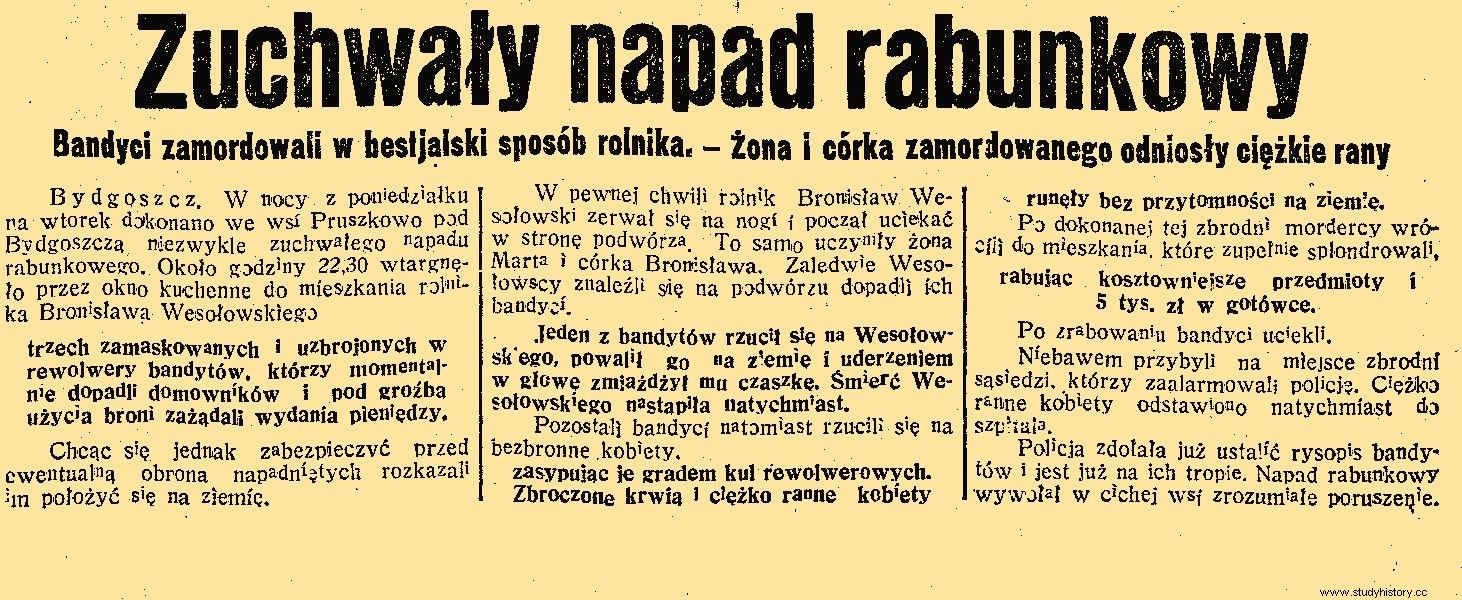
The newspapers accurately described the course of the robbery on the Wesołowski house.
The Wesołowscy must have been quite a wealthy family, because 5,000 zlotys were stolen from them. On today's count, it would be about fifty thousand. The injured women were hospitalized and seem to have escaped death.
The bandits also managed to escape. Admittedly, after two weeks, two suspects were caught, but: because the trial did not show significant evidence of guilt, and the accused presented the court with an "alibi", the court released both of them after the deliberation.
Similar seizures occurred almost daily, although the results varied. Also in February 1936, three armed and masked bandits entered the farm of the farmer Mróz in Ostrów near Gostyń. Pruszkowski's scenario was repeated almost to the letter:the intruders demanded the money, while waving their weapons around. Only the victim's reaction was completely different:
Frost attacked the bandits, they covered him with a hail of bullets, fatally wounding Frost. The son of Mróz took advantage of the bandits' momentary inattention, who caught the fusion and fired at the bandits. The bandits escaped. Investigations showed that one of the bandits was very seriously injured.
Unfortunately, the Gostyn incident died in a rush of similar cases and it is difficult to say whether the perpetrators were caught and then punished.
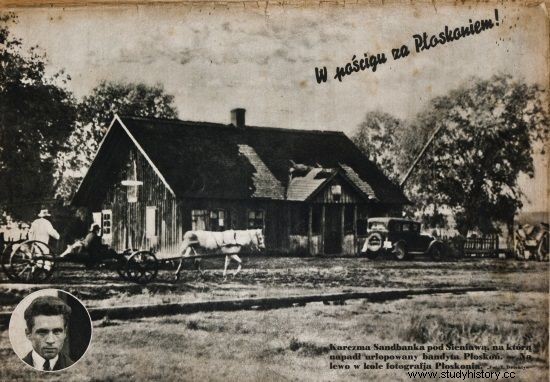
A rural inn, attacked by a "vacation bandit". Illustration of the 'Secret Detective'.
On the other hand, the perpetrators of another rural crime from the same (sic!) Month were caught without a shadow of a doubt. The newspapers reported:
An extremely audacious robbery took place yesterday evening in Wiekowo near Gniezno. Around On the 8th day, 5 individuals entered the homestead of Maria Zychowa. Alarmed by the barking of dogs, the householders jumped up from the table.
The attackers immediately attacked the hosts' first son and brutally beat him. When the second son also defended the estate - they shoved a few bullets into his stomach. Then they fled where the pepper grows, leaving the corpse in the yard. After a short investigation it was revealed that the attackers were ... neighbors at odds with Zychs . This is how the story of the happy Polish village comes full circle.
Sources:
The article is based on source materials and literature collected during the work on the book "Upadłe damy II Rzeczpospolitej".
